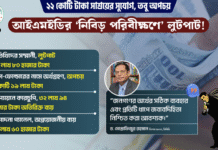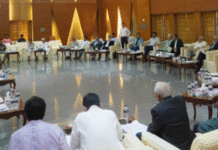
Screenshot of the report on Sheikh Hasina’s interview on The Guardian website
Prime Minister Sheikh Hasina has refuted the allegations of democracy being threatened in Bangladesh by the purported highhandedness of her government and human rights abuses by the police and security forces.
In an interview with Simon Tisdall and Anna Ridout of influential British newspaper The Guardian, she also dismissed the claims of restrictions being imposed on opposition leaders and media.
Highlighting the economic progresses made by Bangladesh under her government’s regime, Hasina said she was trying to ensure basic needs of the people.
“My job is to assist the common people,” she was quoted as saying by the newspaper.
“I do politics for the people, not for me… People are enjoying democracy now.
“What people want is their basic needs. So I’m trying to help people ensure their basic need, that means food security, healthcare, education, and job opportunity and a better life,” the prime minister was quoted as telling the paper.
“All the democratic institutions are working and people are satisfied and people are enjoying it. So the way you say I am dominating, I am not dominating. I am serving people,” she further said in the interview.
BNP Chairperson Khaleda Zia, who is currently in London, has been accusing Hasina-led government of thwarting democracy.
The Guardian in its report also quoted Chairman of Bangladesh Political Science Association Ataur Rahman, Director of Transparency International Bangladesh Iftekharuzzaman and Editor of Daily Star Mahfuz Anam.
They criticised the government’s functioning and expressed apprehension over the fate of democracy and civil rights in the country.
Ataur Rahman claimed the government’s “high-handed behaviour” was damaging faith in democracy and pushing the country on the “brink of a loss of democracy.”
“Most government institutions, like the police and the judiciary, are losing their autonomy. The civil service bureaucracy has lost is independence,” he added.
Iftekharuzzaman alleged that even civil society actors were also under pressure.
“There is an increasing trend towards self-censorship. You can speak out, but you do so at your peril. The NGOs are also heavily regulated now,” he said.
Mahfuz Anam accused the government of “actively persecuting” media after vanquishing all its political rivals.
Hasina, however, rubbished all these allegations in the interview conducted at Dhaka.
She said the BNP had committed a political hara-kiri by boycotting the 2014 parliamentary elections.
In the interview, she also mentioned about her telephonic offer to Khaleda for talks before 2014 elections and accused the BNP of “supporting terrorism and launching killing sprees across Bangladesh.”
As for the allegation of curbing media freedom, she pointed out that it was her government that allowed expansion of private television channels, newspapers and online media since 1990s.
“Who brought the change? It is me. I opened it up. Now we have 41 private television channels [and] altogether nearly 700 newspapers all over the country.
“So they’re writing and they’re totally free. And NGOs are also working according to the rules and law they have,” she told the newspaper.
“In our country we practice democracy like your Westminster type of democracy, so as long as people want, I will be there. If they do not, OK, fine.
“Whether I’m in power or not, I’ll work for the people, and I’m doing it,” she said.
Source: Bd news24









